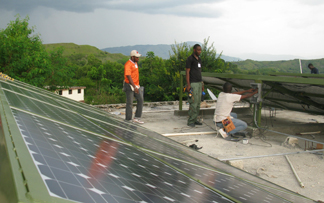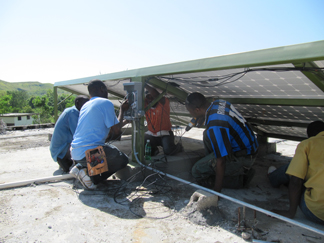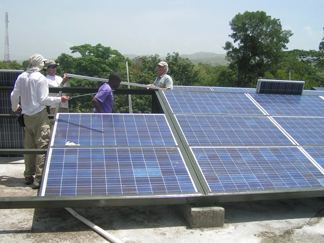Donated Solar Arrays Power Haiti Clinics

Photos courtesy of Robert Freling.
BOUCAN CARRE, Haiti — The Solar Electric Light Fund, an international nonprofit organization that delivers sustainable energy solutions to the developing world, is working to outfit a portion of Haiti’s health clinics with solar power in an effort to create sustainable buildings and lessen environmental impacts.
In collaboration with another global nonprofit, Partners In Health, SELF plans to establish solar systems at five PIH hospitals within the next six to eight months. PIH, based in Boston, Mass., presently operates 12 medical facilities in and around Haiti’s central plateau.
In the remote highlands of Haiti, electricity is a luxury. The majority of buildings operate off the grid in the central plateau region, using gas generators instead to supply power. Largely undamaged by the January 2010 earthquake, Haiti’s central plateau has experienced a rise in demand for healthcare services as Haitians return to their home villages from nearby Port au Prince, where the bulk of the quake damage occurred. The trend has put a strain on the fuel supply of the region’s clinics.

SELF, based in Washington, D.C., has already built solar arrays at three of PIH clinics, including in Boucan Carre, where workers installed a 10-kilowatt solar-diesel hybrid system in September 2009. PIH reports monthly fuel costs at the Boucan Carre clinic have since dropped by 64 percent.
“These systems are going to make the hospitals more sustainable, more reliable and ultimately cheaper to run,” says SELF’s Executive Director Robert Freling. “Solar is more expensive initially, but over time these clinics will actually save money because they won’t have to keep buying diesel fuel month in and month out, year in and year out.
“Solar is also much less vulnerable to disruption,” Freling added. “If you’ve got diesel generators, you have always got to worry about the supply chain of diesel and the difficulty of transporting and paying for the fuel. With solar, that becomes a non-issue.”
A recent gift from photovoltaic panel manufacturer SolarWorld, based in Hillsboro, Ore., will make the installation at the five clinics possible. As part of their “Solar2World” program, the company donated 100 kilowatts in solar panels to the Haiti project.
That donation, along with gifts of five power centers, inverters and controllers from OutBack Power in Arlington, Wash., and a $500,000 grant from the Palo Alto, Calif.,-based environmental advocacy group, 11th Hour Project, will make it possible for SELF to install up to 20-kilowatt solar systems at each of the five hospitals.
Other partners on the project include Trojan Battery Company and Deka Batteries, which are donating energy storage batteries for two clinics.
“For the first phase, we’ll install 100 kilowatts,” Freling says. “We will be looking to do more than that though in the future. The need is tremendous in Haiti. I’d like to install a couple of megawatts in the future – that’s what they need is megawatts upon megawatts of power. There is a huge opportunity to help rebuild the county with solar power.”

Freling expects construction to begin this October on the first of the five clinics. In addition to building the systems, SELF will train employees in the maintenance and operation of the solar arrays.
SELF is currently working in about 20 countries worldwide with an expanded presence in sub-Saharan Africa.
“Our organization is growing, our projects are growing, and the scale of our installations are growing,” Freling says. “We’ve never done single 20-kilowatt installations before, like what we’re doing now with PIH.
“Our mission has also evolved over the years,” he added. “In the past, we were primarily installing solar home lighting systems. Now we are outfitting entire villages, installing solar for everything from water-pumping and irrigation to household electrification and the powering of schools and clinics.”
